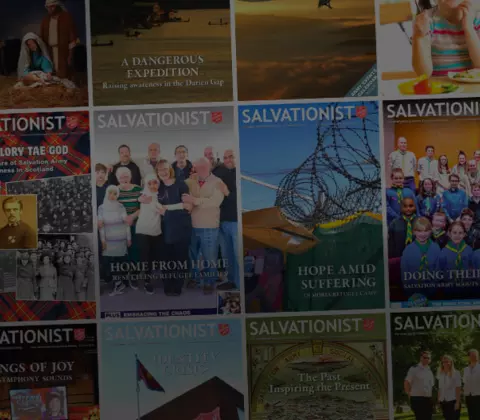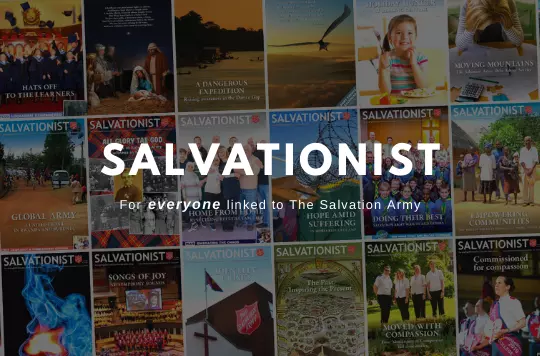
Article of the week: Maximising potential
1 August 2020
FEATURE | My coronavirus story
Secretary for Programme Lieut-Colonel Alberth Sarimin (Indonesia Territory) tells Jo Clark (IHQ) how Covid-19 has affected education
THE country of Indonesia is made up of many islands. We have huge cities but also remote village communities, and the experience of the Covid-19 pandemic has been completely different in these diverse locations.
I am based in the city of Bandung, where I live with my wife and three children, and work at our territorial headquarters. Life in lockdown, has meant adjusting to a new routine and way of being: staying at and working from home, and just going outside once or twice per week to buy things and see what is happening.
Our eldest son is 18 years old and recently graduated from senior high school, having taken his final exams online. This is the way that schooling has gone in the cities, where most people own or can borrow or rent a computer or phone and have internet access.
Our younger children are in ninth and fourth grades and have also been studying from home. These days have been particularly busy for my wife, who has been giving a lot of support to our daughter (our youngest) to use the internet properly so she can access her schoolwork. At the same time she has been managing her work and cooking for the whole family!
While online learning has been a blessing for our family, as parents we have also had to keep a more careful watch on how our children are using the internet and what searches they might be doing. Some evenings we will spend time looking at their search histories from that day so that we can give age-appropriate advice and direction to them.
Although I am now sometimes able to work in the office three or four days per week, the majority of my work is done online, and Microsoft Teams and Zoom have become my regular meeting platforms. In my role as programme secretary, I have regular conversations with divisional leaders and the heads of our territory’s education institutions.
In all these conversations, what I have come to realise is the uneven effect that the coronavirus pandemic has had throughout our country and the different responses that have resulted.
Take, for example, our schools. As a territory we have more than 100 schools, most of them located in remote areas. When the lockdown first happened, all schools were shut. While city-based schools switched quite quickly to putting study materials online or sending them out via email and WhatsApp, this was not possible in remote village areas where families rarely have an internet connection or the technology needed to work with the materials.
I am thankful that our government has taken good initiative with regards to education and has been releasing educational programmes and resources via television. This has been important since it has made a base level of learning accessible to children in most communities.
As the pandemic has progressed, schools that are located in low-risk areas, or ‘green zones’ (mostly the more remote rural areas), have also had more flexibility in the contact they have been able to have with pupils. People in ‘green zones’ have been able to move around more freely than in the higher-risk ‘red zones’, and this has enabled teachers to physically distribute study materials to pupils.
More recently, the government has announced that schools in the ‘green zones’ can take steps towards reopening, although studies for schools in other areas will remain online. This has enabled some of our smallest village schools to restart face-to-face contact and offer learning support to their students.
With the Covid-19 infection rate still high – and increasing in several areas – the situation facing our schools will likely continue to remain a mixed picture in the weeks to come. Balancing public health and safety against economic vulnerability continues to be a dilemma for all in decision-making positions.
Throughout the pandemic lockdown, the economic situation of our teachers and their families has been supported. Those teachers in our schools who are government salaried have continued to receive their allowances and the community-based teachers in our schools in remote, rural areas have continued to receive some regular allowance subsidy support from THQ. In areas where allowances are paid largely from school-fee collection, the authorities have allowed schools some flexibility in the use of their government- provided operational grant, so a greater portion can be used to support staff salaries.
My overall reflection is that this pandemic provides us with the impetus and opportunity to find innovative and new ways for our mission and our education ministry. We are thinking more about sharing ministry materials online – including those targeted for children and young people – we are maximising the potential of online registration for some of our schools and we are focusing more on improving our communications via social media and increasing our visibility. In higher education establishments we are making greater use of online teaching and lectures.
The realities of working from home – not having to travel to a central location for teaching – have enabled us to be more flexible with our time, working out times for lectures and study with our students that better suit the patterns of their daily lives. This enables us all to manage our many responsibilities better.
Today, for example, I will give an evening lecture to students from our theological school in Palu, Central Sulawesi, from my home, so they can make the most of the opportunity of living within what is currently a ‘green zone’ and go about their other daytime duties.
Of course, this also throws up the hard reality of the inconsistencies and inequalities in information technology resource, capacity and opportunity across the different areas of our territory. Redressing imbalances such as these will continue to be one of our greatest challenges as we try to move forward.

From the editor
An early look at the editor's comment

Salvationist
Salvationist is a weekly magazine for members and friends of The Salvation Army

The War Cry
The War Cry is packed with features, reviews, mouth-watering recipes, puzzles and more.